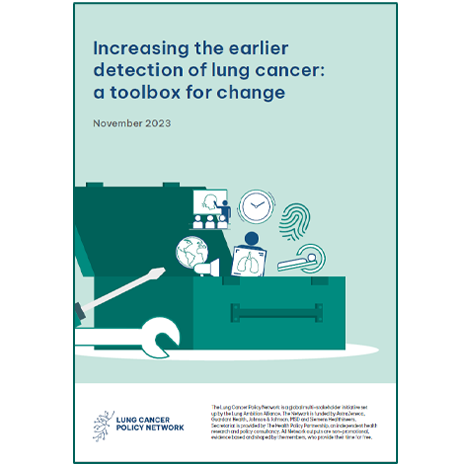This website uses cookies so that we can provide you with the best user experience possible. Cookie information is stored in your browser and performs functions such as recognising you when you return to our website and helping our team to understand which sections of the website you find most interesting and useful.
About this report
This report presents practical and evidence-based tools to support the development and implementation of an early detection strategy for lung cancer. It explores both existing and emerging approaches to early detection, as well as proposing key policy recommendations to inform this strategy development.
Most people with lung cancer currently receive a diagnosis at an advanced stage; this contributes to lung cancer’s status as the leading cause of cancer mortality. Earlier detection offers a unique opportunity to shift diagnosis to an earlier stage, and consequently plays a vital role in improving survival by increasing treatment options such as curative surgery.
While targeted screening of people at high risk of lung cancer using low-dose computed tomography (LDCT) is the most effective means of detecting lung cancer at an earlier stage, there are also alternative approaches available. For these approaches to be effective, they should be designed to complement one another as part of a comprehensive strategy for early detection. They should also be developed in the context of local epidemiology, health system capacity and available resources.
This work has been informed by an extensive review of existing literature and consultation with a wide variety of global experts and Network members. The report proposes a series of recommended actions for health system leaders on key areas such as performing an assessment of capacity, utilising technology and engaging with high-risk communities.
Through this report, we aim to support national decision-makers in making earlier detection an integral feature of cancer control plans. The report offers the tools needed to start taking ambitious steps towards implementing feasible strategies that best serve the differing needs of populations across the globe, and that will ultimately save lives.

DR JESME FOX, MEDICAL DIRECTOR, ROY CASTLE LUNG CANCER FOUNDATION
